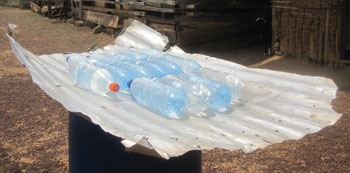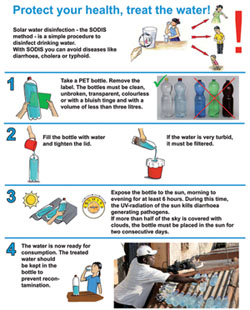Solar disinfection
Solar disinfection, also known as SODIS, relies on energy from the sun to kill pathogenic organisms, especially bacteria. Ultraviolet light from the sun is an effective bactericide for water.
Turbidity is a measure of the cloudiness of water. It is caused by very small particles (suspended solids) that are individually too small to see with the naked eye.
This simple technique requires only a few plastic bottles and sunlight. Firstly, collect several bottles (0.3 to 2.0 litre) made of clear plastic, remove all labels and wash them thoroughly. Fill the bottles with water of low turbidity and shake for about 20 seconds to aerate the water. Expose the bottles to the sun by placing them on a roof or rack for at least six hours (if sunny) or two days (if cloudy). The water is now ready to drink.


The benefits of solar disinfection include:
- proven reduction of bacteria, viruses and protozoa
- acceptability to users because of the minimal cost to treat water, ease of use and minimal change in water taste
- unlikely recontamination because water is consumed directly from the small, narrow-necked bottles (with caps) in which it is treated.
The drawbacks include:
- requires relatively clear water (if the water is too cloudy it has to be filtered first)
- only a limited volume of water can be treated at one time
- the length of time required to treat it.